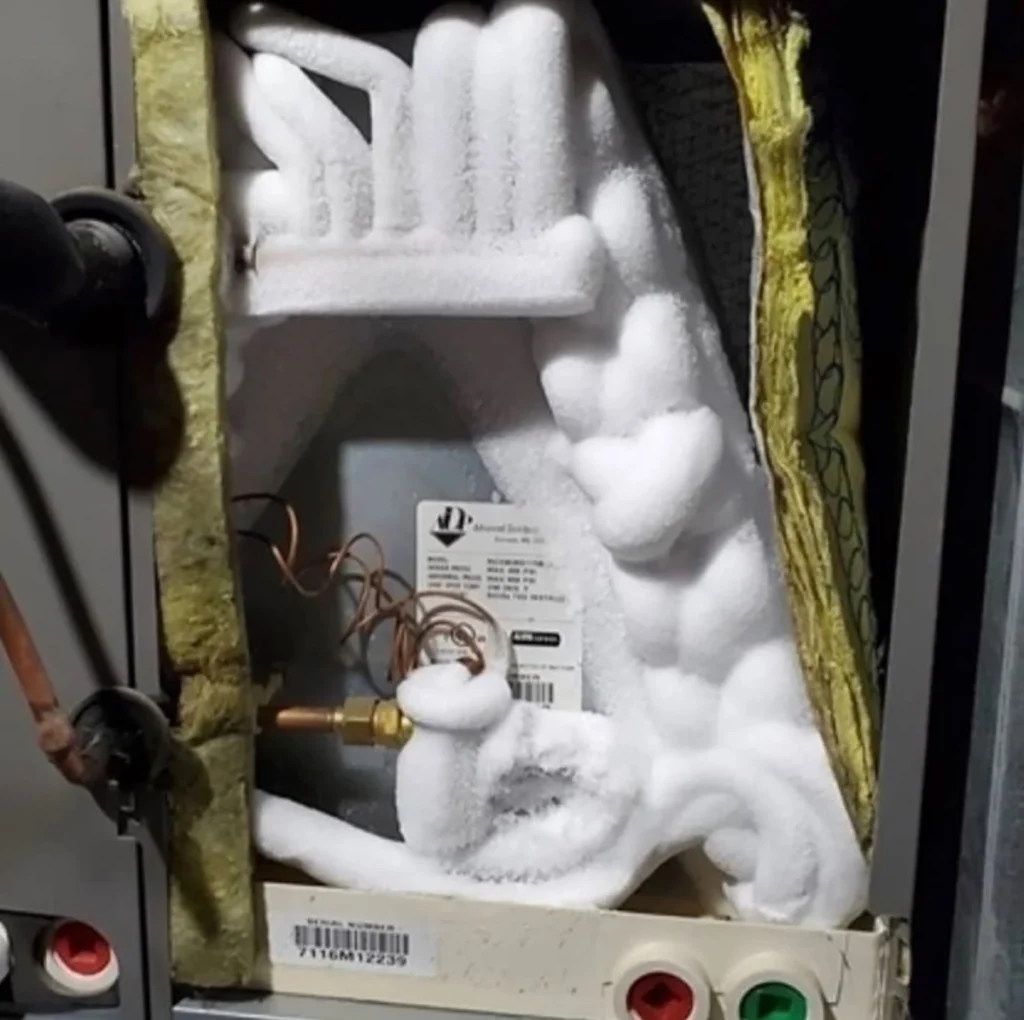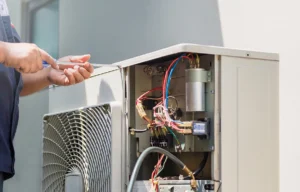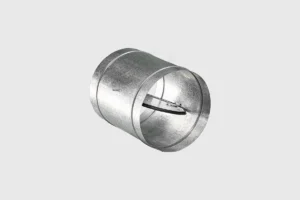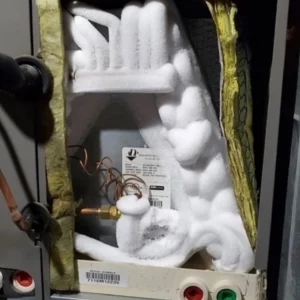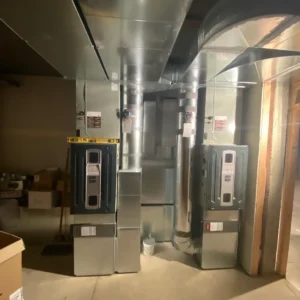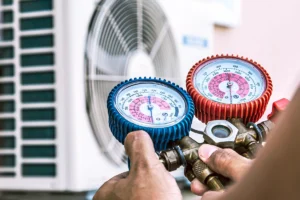An AC unit freezing up is a common problem, but it often points to issues that need immediate attention. Ice on your system usually means something is interfering with normal airflow, refrigerant levels, or coil performance. Left unchecked, it can reduce efficiency, drive up energy costs, and even cause long-term damage to your equipment. The good news is that most freeze-ups can be identified and fixed once you know the warning signs.
Common Reasons for an AC Unit Freezing Up
Restricted Airflow Problems
One of the biggest culprits behind an AC unit freezing up is restricted airflow. When warm air can’t pass freely over the evaporator coils, the refrigerant gets too cold. That cold drops below freezing, and moisture in the air turns to ice.
Clogged filters, closed vents, or blocked ducts can all create this situation. Replacing filters on time and keeping vents open helps reduce the risk. The U.S. Department of Energy notes that clean filters can cut energy use by 5–15%.
Low Refrigerant Levels
If refrigerant runs low due to a leak, your system pressure drops. Lower pressure means the coils become too cold, which leads to an AC unit freezing up. Refrigerant issues aren’t a DIY job. Federal regulations require proper handling, and adding more refrigerant without finding the leak only makes things worse. For consumer-friendly information, check the EPA’s homeowner refrigerant guide.
Dirty Evaporator Coils
Over time, dust, pet hair, and dirt build up on evaporator coils. A dirty coil can’t absorb heat properly, which drops the coil temperature too far. That’s when ice forms. Professional coil cleaning during seasonal maintenance goes a long way toward preventing your AC unit freezing up.
Blower Fan Malfunctions
Your blower fan pushes air across the coil. If the fan slows down, breaks, or runs at the wrong speed, airflow drops. That slower airflow encourages ice to form. A technician can test motor speed, check capacitor strength, and make adjustments before freeze-ups damage the system.
Thermostat or Sensor Problems
Sometimes, the issue isn’t mechanical but electronic. A thermostat that doesn’t sense temperature correctly can keep the unit running too long. Similarly, a faulty coil sensor may fail to shut the system off when it’s too cold. Both problems can cause an AC unit freezing up, even when airflow looks fine.
Signs That Point to an AC Unit Freezing Up
Recognizing symptoms early prevents expensive damage:
-
Ice or frost on refrigerant lines or the indoor coil
-
Weak airflow from vents
-
Water puddles near the air handler as ice melts
-
A system that runs constantly but cools poorly
-
Unexplained energy bill increases
If you notice any of these, turn off your AC immediately to let it thaw. Running a frozen system only makes the problem worse.
Troubleshooting Steps for an AC Unit Freezing Up
Before calling in a pro, there are safe steps you can take:
-
Shut off the system to stop ice buildup.
-
Switch the fan to “On” (not “Auto”) to circulate air and melt ice faster.
-
Check the filter and replace it if it’s dirty.
-
Inspect vents and ducts for blockages.
-
Wait at least 24 hours before restarting the system.
If the ice returns after restarting, the cause is deeper than a simple airflow issue. That’s when it’s time to schedule service.
How to Prevent an AC Unit Freezing Up
Replace Filters Regularly
Replacing filters every one to three months is one of the easiest ways to prevent an AC unit freezing up. Clean filters allow consistent airflow and reduce strain on your system.
Schedule Professional Maintenance
Annual maintenance gives your system a tune-up before heavy use. Technicians clean coils, check refrigerant, test capacitors, and confirm blower speeds. Each step helps stop freeze-ups before they start. ENERGY STAR emphasizes that regular HVAC maintenance protects efficiency and comfort.
Keep Supply and Return Vents Clear
Furniture, rugs, or drapes over vents can choke airflow. Even with a clean filter, blocked vents can cause your AC unit freezing up. Make sure nothing obstructs supply or return grilles.
Insulate Ductwork
Uninsulated or poorly sealed ducts allow cool air to leak out. This imbalance can force your system to overcool coils, which may cause freeze-ups. Adding duct insulation is a preventive step that saves energy, too.
When It’s Time to Call a Professional
If your unit keeps freezing despite filter changes and airflow checks, the issue may be a refrigerant leak, faulty blower motor, or sensor problem. These require professional tools and expertise.
Trying to fix refrigerant or electrical problems yourself can void warranties or create safety risks. A licensed HVAC technician can pinpoint the problem and restore your system to safe operation.
FAQ: AC Unit Freezing Up
Q: How long does it take an AC to thaw after freezing?
A: Depending on the severity, thawing can take anywhere from a few hours to a full day.
Q: Can I keep running my AC if it’s frozen?
A: No. Running a frozen unit risks compressor damage, which is one of the costliest repairs.
Q: Does outdoor temperature affect freeze-ups?
A: Yes. Running your system when outdoor temperatures are below 60°F can trigger freezing because refrigerant pressure drops too low. However, an AC unit freezing up can also happen in hot weather if airflow is restricted or refrigerant levels are off.
Q: Can poor duct design cause freezing?
A: Absolutely. Undersized or restricted ducts can limit airflow and cause freeze-ups even in new systems.
Final Thoughts on AC Unit Freezing Up
In summary, an AC unit freezing up is more than a summertime annoyance. From dirty filters to refrigerant leaks, the causes range from simple to complex. By paying attention to early signs, performing regular maintenance, and calling a professional when needed, you can avoid costly breakdowns and keep your home comfortable.
At Sub Zero Temp Control, we’ve helped countless homeowners here in Vancouver and the surrounding areas stop freeze-ups before they lead to bigger problems. Whether it’s an urgent AC repair or a routine tune-up, our technicians are ready to restore your comfort. Learn more about the city of Vancouver, Washington and the community we serve.
Contact Sub Zero Temp Control Today
If your AC unit is freezing up, don’t wait until it causes bigger issues. Call Sub Zero Temp Control today at (360) 839-7670 or schedule an appointment online. Our team is here to deliver fast, reliable service to keep your home comfortable year-round.
_________________________________________________________________________________________________


